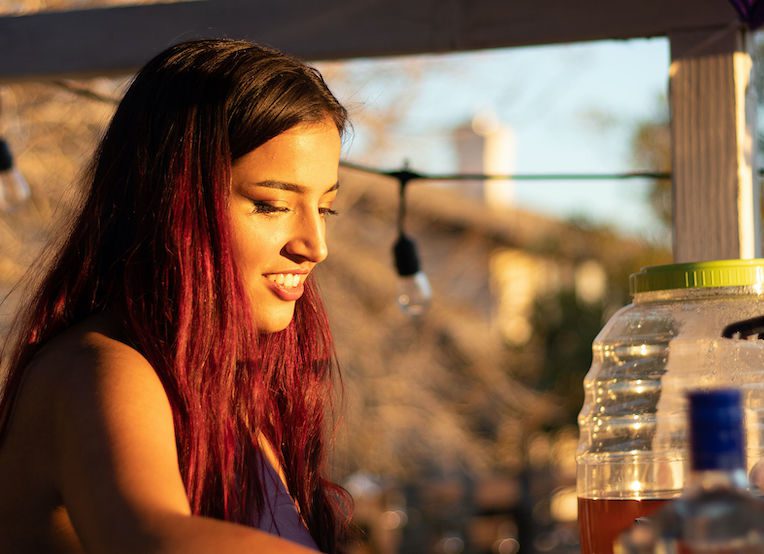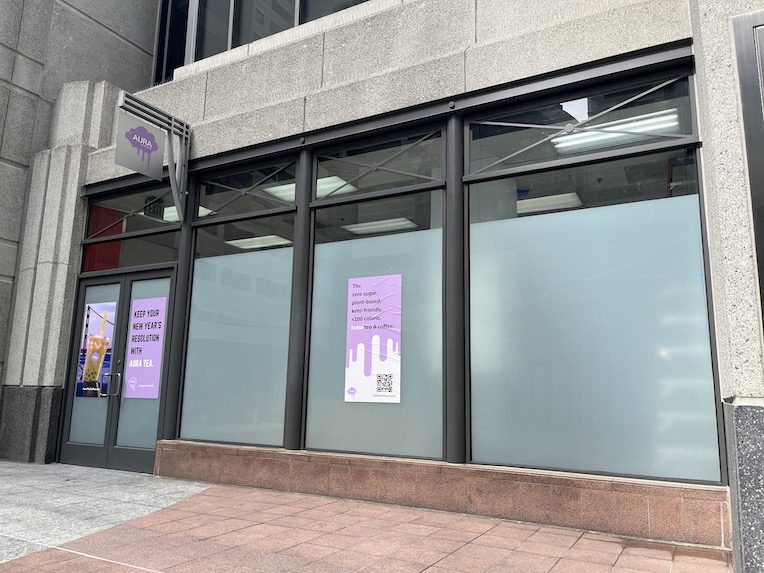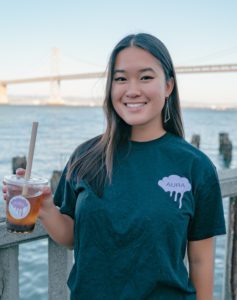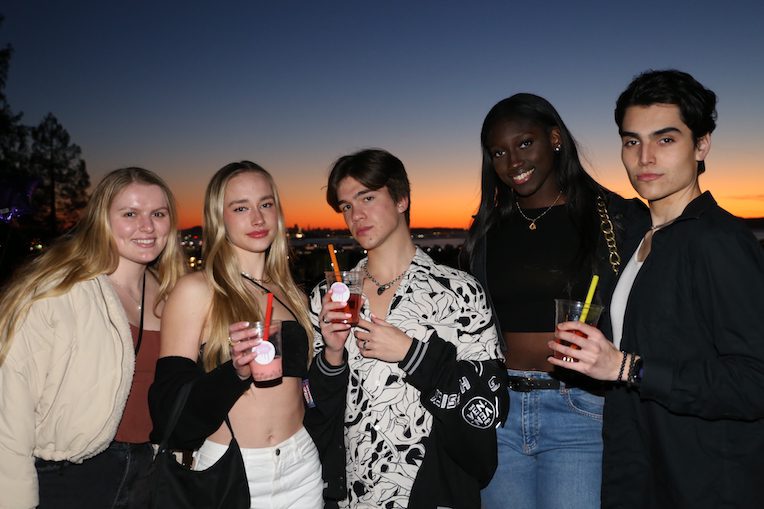
Kashish Juneja, BS 22, is learning about running a business in real-time as she prepares to open startup Aura Tea’s first shop in downtown San Francisco on March 27. In between juggling a mid-term and going to class she’s taking calls from her contractor and interviewing for counter help at the shop that will serve boba tea with a twist: It’s sugar free, made with plant-based milks, and under 100 calories.
“It’s insane from the operational side,” said Juneja, whose first shop is strategically located on Spear Street across from Google and Databricks offices, where employees are starting to trickle back. “We need to make sure there’s a demand and that we’re making sure the product is good enough so that people will continue showing up.”
In many ways, Aura Tea has been a team effort from the start. Juneja recruited 22 interns from the UC Berkeley community who help with marketing, TikTok, and Instagram, where she’s drawn support from NFL players to local musicians. Students and Cal athlete ambassadors helped her host on-campus events that offer “boba for de-stressing”—and she recently held a pop-up on Telegraph Avenue in Berkeley, giving away Cal-themed boba tea drinks.

Kaitlin Dang, BS 24, an intern who serves as business growth lead at Aura Tea, said her favorite Aura flavor is mango pineapple.
“Before I started working here I was an avid milk tea connoisseur, trying new places,” said Dang, who is in her second year of the Berkeley Haas Global Management Program. “My taste has changed from sweeter teas and now I drink a lot of fruit teas. Most fruit teas are very sweet and not refreshing. Aura tea has a refreshing taste.”
Solving her own problem
Juneja, who grew up in Cupertino, has always loved boba. “Our high school was boba central, with a boba shop across the street that was open during lunch every day,” she said. “I played tennis every day so it balanced out.”

Her boba addiction continued at Berkeley, but drinking those 500 extra boba calories without her usual tennis playing led to an unwanted 30-pound weight gain. Aura Tea, she said, was founded in part to solve her own problem.
The idea to start making healthier boba tea emerged during a Plant Futures course that she took with Will Rosenzweig, the faculty chair of the Center for Responsible Business at Haas who co-founded the Republic of Tea.
She’d already taken an entrepreneurship bootcamp and was interested in starting a company. Plant Futures, a collaboration between Berkeley Haas, Public Health, Engineering, Public Policy, and the Berkeley Food Institute, pushed her idea forward.
Throughout the pandemic, Juneja could be found crafting tea in her apartment, testing different oat, almond, and pea milks, which make her tea drinks vegan, and sweeteners, using fresh loose leaf green and black teas from the grocery store. (Boba pearls are naturally vegan, as they’re made of tapioca starch, which comes from cassava root.)
Juneja tested her teas on friends and classmates. In the early recipe days, she conducted a blind taste test: her milk tea against the Boba Guys’ tea and others. (Boba Guys was co-founded by Andrew Chau, MBA 11.) “We didn’t win but it was a good start,” she said. “Our taste was nowhere that it is now.”
It took time to get Berkeley-based impact investor David Jiang to take a chance on her venture, she said. Jiang’s wife’s father was a tea farmer in China, and they all shared an interest in tea. “There was a lot of making it and taking it back to them,” Juneja said. “I was taking what I learned in class and bringing them my tea and my pitch deck.”
I was taking what I learned in class and bringing them my tea and my pitch deck.
Valuable startup experience
The shop, which will take to-go orders online, will offer a combination of grab-and-go and fresh-brewed drinks with boba tea in flavors including strawberry, matcha, pineapple, and mango. Aura will offer coffee drinks, too, and a masala chai with infused with spices and CBD for relaxation. (Aura’s boba pearls are made by US Boba Company in nearby Hayward, Calif. Her tea is sweetened with Purecane, which she says she chose for its lack of an aftertaste.)

Dang said she’s getting valuable experience working for Aura. “There’s a lot of creativity involved,” she said. “I have the space to try the things I want to try. We’re appealing to a certain wide demographic: corporate employees, health influencers, healthcare professionals, and foodies. I like to try things I’ve seen work in other industries, casting a wide net.”
Juneja, who will work in the shop part-time until graduation, said she’s grateful to her entire community of classmates, professors, and advisors for all of their help with Aura’s creation.
“When I wrote my essay to get into Haas I said I wanted to solve a problem,” she said. “My dream came true.”